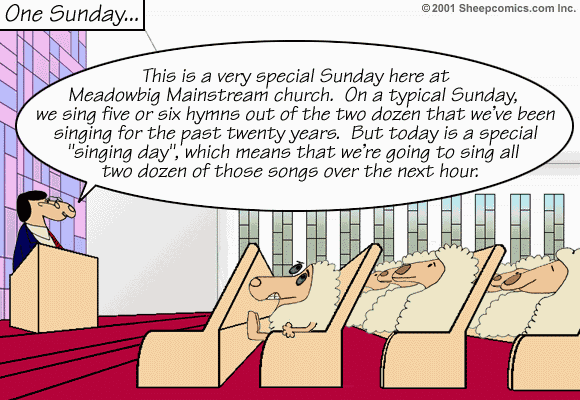
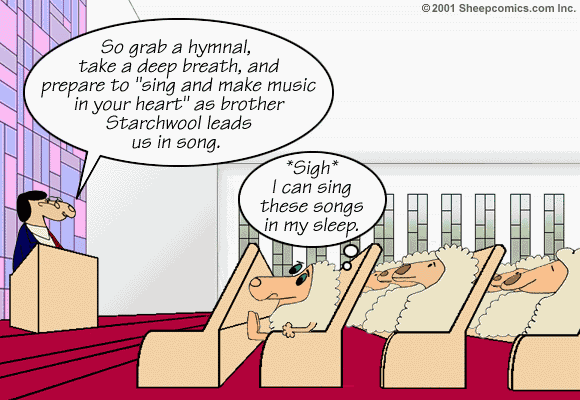

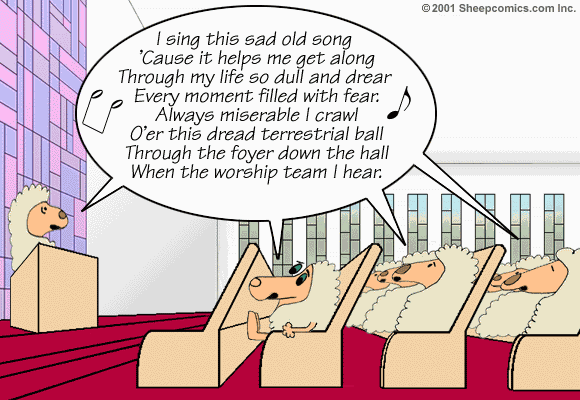

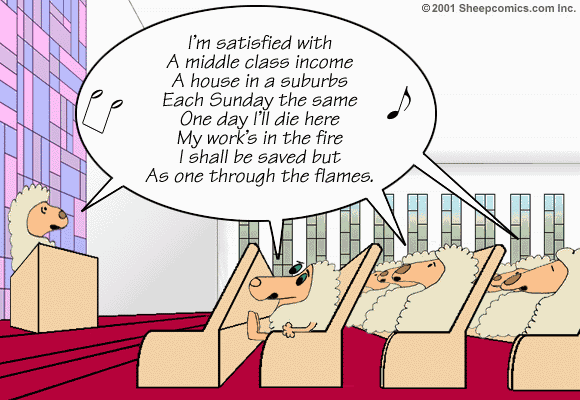


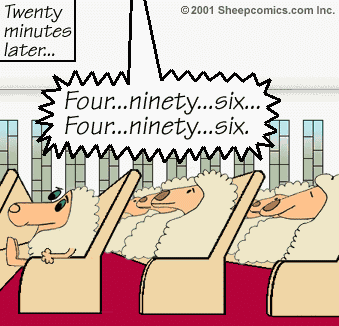
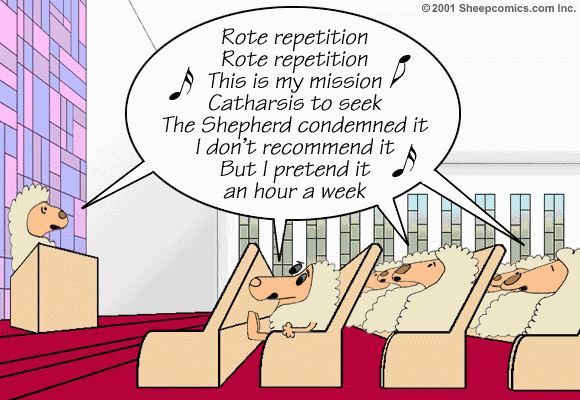

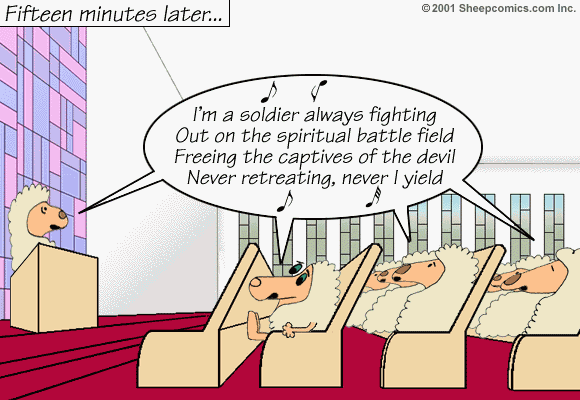

Editorial Notes
Warning! The following editorial is the product of a tortured mind. It may include venting, ranting, incorrect grammar, and something to think about. Look out below!
What is singing in church supposed to be all about?
For most of my adult life, Iíve woken up Sunday morning, driven to where "church" is, sat down before speaking to anyone and before being particularly awake, and have been forced to sing through a list of numbered songs in a book while staring at the back of someoneís head. My singing only interrupted by the "song leader" doing his best to impersonate "Robby the Robot" as he dispassionately reads the song numbers.
Speaking of robots, Iíve learned to be a pretty good one too. Barely awake? Who cares! Nothing to sing about? So what! Itís "song service" time. Time to perform! Time to sing whether your heart or mind is in it or not. Donít like to "sing on demand" for a half-hour or more? Well, you must not be very spiritual. Donít take pleasure in singing that song youíve been singing almost every Sunday for the past twenty years? Itís your problem. If you were really spiritual, you would thrive on mindless, grinding, monotonous repetition. If you were really spiritual, your heart would be happy when itís told to be happy and sad when itís told to be sad, all within the same half-hour. If your heart was right, it would sing on demand right along with your mind and your mouth.
Donít you know what Paul wrote in Colossians 3:16?
Let the word of Christ dwell in you richly as you teach and admonish one another with all wisdom, and as you sing psalms, hymns and spiritual songs with gratitude in your hearts to God.
What this means is that everyone who calls themselves a Christian should consider themselves privileged to sit with hundreds of people in a huge room, all in rows facing one direction, and sing what theyíre told to sing as the numbers are read over a PA system. Isnít this obvious? If there isnít any "gratitude in your heart" for this, then you are in violation of scripture. You need to repent and force yourself to enjoy this, or else!
Well, this doesnít work for me, and it never really has. I love music. I have a CD player and a speaker (with subwoofer) system in the computer Iím writing this with. Since my computer has Bible software in the CD drive, Iím listening to the vinyl turntable behind me. I have a CD player in both cars, and one in the computer I use at work. I listen to a lot of music, and I recommend some of the best Iíve found in the store section of this web site.
So, my problem with singing at church isnít a result of a dislike of music in general. In fact, when I think about it objectively, I donít particularly dislike any of the songs Iíve sung in church (OK, maybe one or two). I actually like some of them. Songs donít get printed in hymnals because they are bad.
So whatís my problem? I really had to think of this for a while, and now Iím ready to share my "self diagnosis" with you.
My problem with church music centers around the issues of coercion and repetition.
Singing in church, especially during Sunday worship services, is something you do "on demand" simply because itís time to do it. You do it the same time each week, whether you are happy or sad, and whether or not your heart is into it. You sing because someone tells you to sing. Itís part of the program.
Why is it part of the program? Itís hard to know for sure. I think some churches have been doing things the same way for so long that they have completely forgot that decades or centuries ago some leaders simply decided to do things a certain way. The decisions made by those leaders became "tradition" which, of course, means you arenít even allowed to think about changing them.
Other churches are sure to have reasons for everything they do. Some churches have a "song service" each Sunday because Paul wrote the passage in Colossians we saw above, and a very similar passage in Ephesians 5:19.
"Speak to one another with psalms, hymns and spiritual songs. Sing and make music in your heart to the LordÖ"
It seems that in these churches God is thought of as a "monster in the sky" who demands a performance of everyone every Sunday morning, whether itís heartfelt or not. (Of course, itís better if itís heartfelt, but if not, then youíd better do it anyway.) Of course, we donít want to offend the "god of churchianity" while heís watching us for 90 minutes on Sunday, so we have to pick through the New Testament and find a prooftext for everything we do. The passages Iíve quoted from Colossians and Ephesians are the prooftexts that let us know that we are supposed to sing every Sunday morning. Since itís all about performance, not people, itís expedient to let one person plan a list of songs and have everyone else sing through the list. Itís safer that way.
My second issue is repetition. This may not be your experience, but personally Iím well into my second decade of singing from the same set of a few dozen songs. Yes, there is some variation, but not much. Most churches seem to have their "pet hymns", the ones they sing more often than others. There are a few songs that Iím sure Iíve sung "on demand" hundreds of times. Theyíre good songs, but theyíve worn a hole in my mind. Right now I donít care if I never hear them again.
We all have different tolerances for repetition. Some people seem to crave it. They seem to like nothing better than to do the same thing the same way week after week, year after year. Perhaps rote repetition provides them with some sort of center or security. "Worship service" seems to have been designed with these kinds of people in mind.
Then there are people thrive on variety. They get "burned out" if they have to do the same thing the same way over and over. "Church" isnít very friendly to this type of person. To this type of person, forcing them to sing the same song over and over seems almost like a form of abuse. Iím this kind of person.
So once I had identified just what my issues are with church singing, I decided to think about how singing works in the Bible and outside "church".
I did a survey of the Bible, Old Testament and New, and asked myself "When and why did people sing?" Here is what I found.
First, singing is used to mark momentous events. In Exodus 15, Moses and the Israelites sang a song to praise God for the destruction of the Egyptian army.
In Numbers 21:17-18, Israel sang a song when the Lord gave them water.
Then Israel sang this song: "Spring up, O well! Sing about it, about the well that the princes dug, that the nobles of the people sank-- the nobles with scepters and staffs." Then they went from the desert to Mattanah,Ö
In Judges 5, Deborah and Barak sang a song of praise to God for the defeat of the Canaanties.
In 2 Samuel 3:33, David sings a lament over the death of Abner.
These are examples of singing that occurred "real-time", right after an event.
Second, singing also occurred regularly as one of the activities of the priests and Levites, as we see in Chronicles 31:2.
Hezekiah assigned the priests and Levites to divisions--each of them according to their duties as priests or Levites--to offer burnt offerings and fellowship offerings, to minister, to give thanks and to sing praises at the gates of the Lord's dwelling.
Of course, singing and songs are what the Psalms are all about. Some of the Psalms commemorate events in the life of David, when he cried out to God for help, and when God delivered him. They all seem to be very much from the heart, and many were assigned to the "director of music", one who seems to have had charge over those in the priesthood whose purpose was to sing.
After my very brief survey of Old Testament singing, I found that much of it involves responses to the great deeds of God, either immediately after those deeds occurred, or as a memorial sometime after those deeds occurred. Also, there are songs of praise to God that are not related to a specific historical event.
David appointed some of the Levites to work in full-time music, as is written in 1 Chronicles 15:16.
David told the leaders of the Levites to appoint their brothers as singers to sing joyful songs, accompanied by musical instruments: lyres, harps and cymbals.
What about the average Israelite? Was music regimented for them somehow? Was there a certain day and time they all had to sing five or six psalms in a row? If so, I donít see it in the Old Testament.
What about singing in the New Testament?
After all the singing in the Old Testament, the New Testament is rather anti-climactic. Letís look at where singing is mentioned, other than the two passages quoted above, Revelation, and where the Psalms are quoted.
The Gospels of Matthew and Mark both record that the apostles sang a hymn after their Passover supper with Jesus. Mark 14:26 says,
When they had sung a hymn, they went out to the Mount of Olives.
Paul mentions singing in 1 Corinthians 14:15.
So what shall I do? I will pray with my spirit, but I will also pray with my mind; I will sing with my spirit, but I will also sing with my mind.
Paul also writes in 1 Corinthians 14:26.
What then shall we say, brothers? When you come together, everyone has a hymn, or a word of instruction, a revelation, a tongue or an interpretation. All of these must be done for the strengthening of the church.
Then we have James 5:13.
Is any one of you in trouble? He should pray. Is anyone happy? Let him sing songs of praise.
Where is the "song service"? Where are Christians forced to sing for a half-an-hour whether they want to or not? James says that songs of praise are appropriate for someone who is happy. Paul describes what seems to be Christians sharing hymns with each other, not programmed, dictated singing.
What about Paulís admonishments in Colossians and Ephesians? Was Paul describing a "song service"? No, he gave these instructions as part of a larger set of instructions for life in general. This singing is to be one-another and from the heart. Is there one time and place a week when this can happen? Of course not.
What I imagine when I read these passages are Christians working together, perhaps women making bread, or men out in the field, singing spiritual songs as they do their daily work. Singing has long been a way to pass a day in manual labor. It eases the drudgery of monotonous, repetitive work. It takes religion to make singing itself into monotonous, repetitive work.
Now Iím going to take leave of my computer and go jogging. I often sing to myself while I run. I have to since my "jogger CD player" broke. But you can be sure Iím singing because I want to.
Web Shepherd